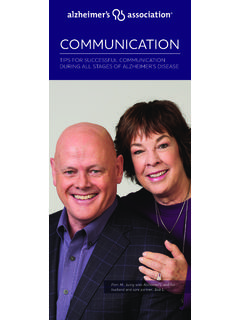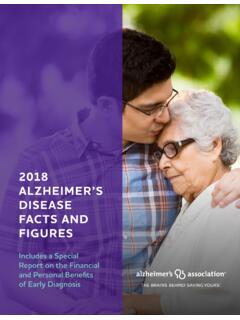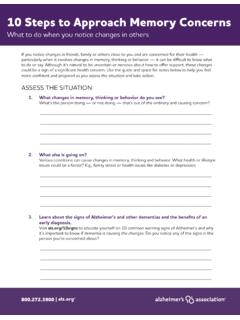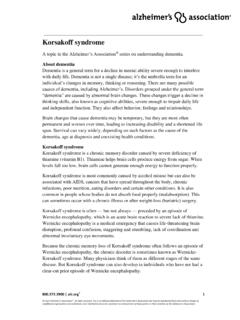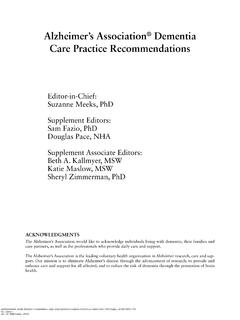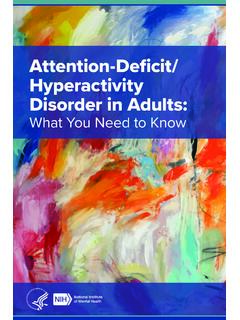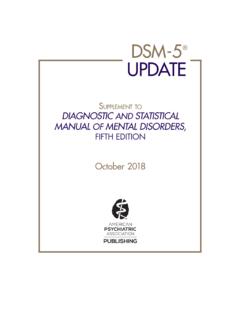Transcription of FDA-Approved Treatments for Alzheimer's
1 FDA-Approved Treatments for Alzheimer's Although current medications cannot cure Alzheimer's , one treatment may delay clinical decline, with benefits to cognition and function. Others may help lessen symptoms, such as memory loss and confusion. The Food and Drug Administration (FDA) has approved medications that fall into two categories: drugs that may delay clinical decline in people living with Alzheimer's , and drugs that may temporarily mitigate some symptoms of Alzheimer's disease. When considering any treatment, it is important to have a conversation with a health care professional to determine whether it is appropriate.
2 A physician who is experienced in using these types of medications should monitor people who are taking them and ensure that the recommended guidelines are strictly observed. Drugs that may delay clinical decline Drugs in this category may delay clinical decline with benefits to both cognition and function in people living with Alzheimer's disease: Aducanumab (Aduhelm ): anti-amyloid antibody intravenous (IV) infusion therapy approved for Alzheimer's disease. An FDA-Approved diagnostic test is required; talk with your doctor about options. Aduhelm works by targeting beta-amyloid, a microscopic protein fragment that forms in the brain and accumulates into plaques.
3 These plaques disrupt communication between nerve cells in the brain and may also activate immune system cells that trigger inflammation and devour disabled nerve cells. While scientists aren't sure what causes cell death and tissue loss during the course of Alzheimer's disease, amyloid plaques are one of the potential contributors. Aduhelm is the first therapy to demonstrate that removing beta- amyloid resulted in better clinical outcomes. Aduhelm was shown in clinical trials to delay the clinical decline of people living with early Alzheimer's disease (mild cognitive impairment (MCI) due to Alzheimer's or mild Alzheimer's dementia).
4 | 1. 2021 Alzheimer's Association . All rights reserved. This is an official publication of the Alzheimer's Association but may be distributed freely and without charge by unaffiliated organizations and individuals. Such distribution does not constitute an endorsement of these parties or their activities by the Alzheimer's Association. Some people who received Aduhelm experienced significant benefits on measures of cognition and function. Examples include abilities such as memory, orientation and language. Some also experienced benefits on activities of daily living, which refers to the everyday skills we need to take care of ourselves and live well independently.
5 Conducting personal finances, performing household chores (such as cleaning, shopping and doing laundry) and independently traveling out of the home are all examples of activities of daily living. In clinical trials, the most common side effects were ARIA-E (abnormal brain changes associated with anti-amyloid Treatments most often swelling in the brain that are spotted with neuroimaging techniques like MRI), headache, ARIA-H (micro hemorrhage/superficial siderosis) and fall. Drugs that treat symptoms Cognitive symptoms (memory and thinking). As Alzheimer's progresses, brain cells die and connections among cells are lost, causing cognitive symptoms to worsen.
6 While these medications do not stop the damage Alzheimer's causes to brain cells, they may help lessen or stabilize symptoms for a limited time by affecting certain chemicals involved in carrying messages among and between the brain's nerve cells. The following medications are prescribed to treat symptoms related to memory and thinking: Cholinesterase inhibitors (Aricept , Exelon , Razadyne ). Cholinesterase (KOH-luh-NES-ter-ays) inhibitors are prescribed to treat symptoms related to memory, thinking, language, judgment and other thought processes. These medications prevent the breakdown of acetylcholine (a-SEA- til-KOHlean), a chemical messenger important for memory and learning.
7 These drugs support communication between nerve cells. The cholinesterase inhibitors most commonly prescribed are: Donepezil (Aricept ): approved to treat all stages of Alzheimer's disease. | 2. 2021 Alzheimer's Association . All rights reserved. This is an official publication of the Alzheimer's Association but may be distributed freely and without charge by unaffiliated organizations and individuals. Such distribution does not constitute an endorsement of these parties or their activities by the Alzheimer's Association. Rivastigmine (Exelon ): approved for mild-to-moderate Alzheimer's as well as mild-to-moderate dementia associated with Parkinson's disease.
8 Galantamine (Razadyne ): approved for mild-to-moderate stages of Alzheimer's disease. Though generally well-tolerated, if side effects occur, they commonly include nausea, vomiting, loss of appetite and increased frequency of bowel movements. Glutamate regulators (Namenda ). Glutamate regulators are prescribed to improve memory, attention, reason, language and the ability to perform simple tasks. This type of drug works by regulating the activity of glutamate, a different chemical messenger that helps the brain process information. This drug is known as: Memantine (Namenda ): approved for moderate-to-severe Alzheimer's disease.
9 Can cause side effects, including headache, constipation, confusion and dizziness. Cholinesterase inhibitor + glutamate regulator (Namzeric ). This type of drug is a combination of a cholinesterase inhibitor and a glutamate regulator. Donepezil and memantine (Namzaric ): approved for moderate-to- severe Alzheimer's disease. Possible side effects include nausea, vomiting, loss of appetite, increased frequency of bowel movements, headache, constipation, confusion and dizziness. Non-cognitive symptoms (behavioral and psychological symptoms). Alzheimer's affects more than just memory and thinking.
10 A person's quality of life may be impacted by a variety of behavioral and psychological symptoms that accompany dementia, such as sleep disturbances, agitation, hallucinations and delusions. Some medications focus on treating these non-cognitive symptoms for a | 3. 2021 Alzheimer's Association . All rights reserved. This is an official publication of the Alzheimer's Association but may be distributed freely and without charge by unaffiliated organizations and individuals. Such distribution does not constitute an endorsement of these parties or their activities by the Alzheimer's Association.
